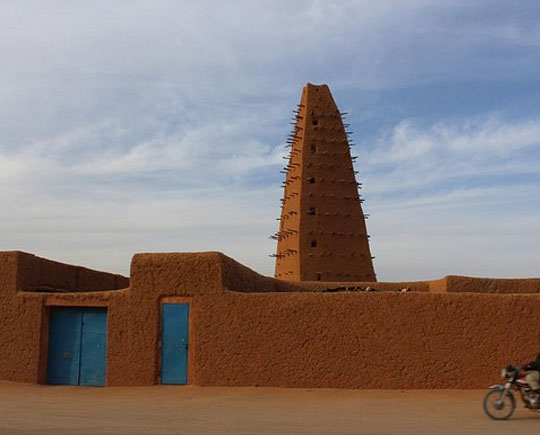Niger (NE)

1. Obtain a valid passport: Ensure your passport is valid for at least six months beyond your intended stay in the destination country.
2. Complete the visa application form: Fill out the tourist visa application form accurately and completely. You can usually download the form from the embassy or consulate website.
3. Gather required documents: Collect the necessary documents for your tourist visa application, such as passport-sized photos, proof of accommodation, travel itinerary, and proof of sufficient funds.
4. Pay the visa fee: Check the visa fee amount and payment methods accepted by the embassy or consulate. Pay the fee either online or at the designated payment location.
5. Schedule an appointment: Some countries require you to schedule an appointment for a visa interview or document submission. Make sure to book your appointment in advance.
6. Attend the visa interview: If required, attend the visa interview at the embassy or consulate. Be prepared to answer questions about your travel plans and provide any additional documents requested.
7. Wait for visa processing
Here are the direct links to the online tourist visa application portals for Niger:
1. Official website for eVisa application: https://www.evisa.gouv.ne/
2. Ministry of Foreign Affairs website for visa information: https://www.mae.gov.ne/visa
Please note that these links will take you to the official government websites for visa applications. Make sure to follow the instructions carefully and provide all the required information for your tourist visa application to Niger.
- Valid passport
- Passport-sized photos
- Completed visa application form
- Proof of accommodation (hotel reservation, invitation letter)
- Travel itinerary (flight reservation, travel insurance)
- Proof of sufficient funds (bank statements, sponsorship letter)
- Letter of employment or business registration
- Yellow fever vaccination certificate
- Marriage certificate (if applicable)
- Birth certificate for minors
- Police clearance certificate
- Visa application fee
Ensure all documents are in English or French and are valid and up-to-date. Additional documents may be required depending on the type of visa being applied for. It is recommended to check with the embassy or consulate for the most up-to-date and specific requirements for the visa application.
To extend your visa in Niger, follow these steps:
1. Visit the Direction Générale de la Documentation et de l'Immigration (DGDI) office in Niamey at least one week before your current visa expires.
2. Fill out the visa extension application form and provide all necessary documents, including your passport, current visa, proof of funds, and a letter explaining why you need to extend your stay.
3. Pay the visa extension fee at the designated bank and obtain a receipt.
4. Wait for the DGDI to process your application, which typically takes 1-2 weeks.
5. Once approved, collect your extended visa from the DGDI office.
6. Make sure to abide by the new visa expiry date and avoid overstaying your welcome in Niger.
It is important to note that not all visas can be extended, and the decision ultimately lies with the immigration authorities. If your visa cannot be extended, you may need to leave the country and reapply for a
Travelers to Niger are required to have a valid passport with at least six months validity remaining. A visa is also required for entry into the country. Yellow fever vaccination is mandatory for all travelers over the age of one year. In addition, it is recommended to be up-to-date on routine vaccinations such as measles, mumps, and rubella (MMR), diphtheria, tetanus, and pertussis (DTaP), and influenza.
It is advisable to consult a healthcare provider or travel clinic at least four to six weeks before your trip to ensure you have all necessary vaccinations and medications. It is also important to take precautions against mosquito-borne illnesses such as malaria by using insect repellent, wearing long sleeves and pants, and sleeping under a mosquito net.
Travelers should be aware of the current security situation in Niger and take precautions to ensure their safety. It is recommended to avoid travel to certain areas of the country, particularly those bordering Mali, Libya, and Nigeria
Travelers to Niger should be aware of certain local laws and customs to ensure a safe and respectful visit. It is important to dress modestly, especially in rural areas, to show respect for the local culture. Public displays of affection should be avoided, as they are not commonly accepted in Nigerien society.
Alcohol consumption is legal in Niger, but public drunkenness is frowned upon. It is also important to respect the Islamic religion, which is the predominant faith in Niger. Visitors should refrain from eating, drinking, or smoking in public during the month of Ramadan.
It is important to be aware of the local laws regarding photography, as taking pictures of government buildings, military installations, or airports is prohibited. Drug laws are strict in Niger, and travelers should avoid any involvement with illegal substances.
Overall, visitors to Niger should be respectful of the local customs and laws to ensure a positive and safe experience in the country.
Niger is a landlocked country in West Africa, known for its vast desert landscapes and diverse wildlife. The country is home to the largest protected area in Africa, the Air and Ténéré Natural Reserves, which is a UNESCO World Heritage Site. Niger is also famous for its traditional music, including the popular genre called Hausa music.
Niger is one of the hottest countries in the world, with temperatures often exceeding 40 degrees Celsius. The country is also one of the poorest in the world, with a high percentage of its population living below the poverty line. Despite these challenges, Niger is known for its rich cultural heritage and warm hospitality towards visitors.